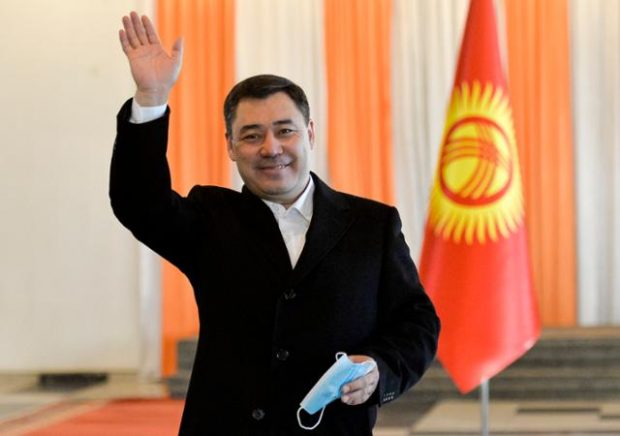
Kyrgyzstan: What future is the country in turbulence expecting?

By Meder Taabaldiev
BISHKEK: In Kyrgyzstan, October 4 marked one year since the 2020 parliamentary election, the results of which sparked massive protests – a culmination of previous president Sooronbai Jeenbekov’s incompetent rule. Pro-government parties took an overwhelming majority of the seats according to the preliminary results.
Based on many instances of electoral fraud and vote buying opposition parties staged a protest the next day, which erupted into unrest by evening.
Former president Almazbek Atambayev and future president Sadyr Japarov were freed from prison. The failed elections would soon after lead president Jeenbekov to resign and Japarov to become acting president.
Amidst the global pandemic, crumbling economy and the government’s complete inability to handle these crises, there was hope that the events that took place would bring considerable change in Kyrgyz politics.
Much of the people’s hope seemed to have been singularly entrusted to Sadyr Japarov. He had a turbulent and explosive career – he was elected as a member of the parliament in 2005 and then he became adviser to ousted president Kurmanbek Bakiyev. He was later exiled and then imprisoned for an attempt to kidnap rival politician Emilbek Kaptagaev.
Yet he still managed to gather a devoted following in recent years for being a strong proponent of nationalizing Kumtor (Kyrgyzstan’s largest gold mine).
Japarov also suffered personal tragedy during his prosecution and prison term – losing several family members, including his eldest son. Many of his fans express sympathy and relate to both his political views, which some critics view as nationalist, and to the misfortunes in his personal life.
With their unprecedentedly passionate and vocal support, he was able to be elected as president of Kyrgyzstan in January 2021, gathering 79% of the votes, with a 39% voter turnout (smallest turnout for a presidential election yet).
Alongside presidential elections, the people of Kyrgyzstan voted in a government system referendum the same day, where 84% of the voters expressed their preference to step away from a parliamentary system of government and readopt a presidential system.
This was followed by another constitutional referendum held in April 2021 to adapt a newly drafted constitution. It was approved by 85% of the voters and signed by Japarov into law in May 2021.
With the new constitution, the president’s power was significantly increased, while the parliament’s authority was diminished. The president became the head of the entire executive branch and gained the ability to appoint government ministers, almost all judges and law enforcement chiefs.
The president, who could previously only serve a single six-year term, can now assume power for two consecutive five-year terms.
The new constitution makes the president the central figure again, giving him a supra-strong mandate.
Human Rights Watch deemed the new constitution problematic as it “undermines human rights norms and weakens checks and balances necessary to prevent abuses of power”.
The supporters of this change, however, view it as an opportunity for a single person to take charge and make stronger and significant changes with less interruption from other agencies.
In reality, the previous parliamentary system never truly saw the parliament assume their full power and influence under previous regimes, as, in practice, it was continuously impaired by the presidents’ influences and hindrances. The new constitutional change brings about the legitimacy of the president’s powers.
The new and revised parliamentary elections are scheduled to take place on November 28, 2021. Though they were promised to take place no later than summer 2021, President Japarov announced their postponement to autumn soon after taking office. As signed into law on May 5, 2021, the elections are to be held in accordance to a mixed electoral system.
The size of the parliament was reduced from 120 to 90 seats. Out of them, 54 are to be selected by proportional representation through national party lists, while the remaining 36 are selected in individual single seat districts. The threshold for parties to pass into parliament was also reduced from 7% to 5% of all votes, with a requirement to get at least 0.7% of votes in each region of the country.
A major change was the abolition of Form No. 2 – a document allowing Kyrgyz citizens to vote in places outside of the districts where they are documented as residents. This measure was taken due to parties abusing the document and having an overwhelming number of people vote in different regions to manipulate the vote stats.
Because the results of the parliamentary elections were annulled, the previous parliament members remained in their positions as part of the interim parliament. It was deemed by many experts as the most inept parliament to date, due to an unqualified cast that sparked many controversies, jokes and viral videos.
Much to people’s dismay, many of the same people are planning to participate in the new elections. These same people were also among the party lists in the annulled elections of 2020. As such, the common sentiments among many people in regards to the new parliamentary elections are that of pessimism. After all, the parliament as an establishment has become the main culprit to blame for the crises that befell Kyrgyzstan after the country’s shift to a parliamentary system in 2010.
The people of Kyrgyzstan had hoped for change – politically, economically and socially.
One of the driving forces of Sadyr Japarov’s popularity was his resolve to nationalize the Kumtor Gold Mine – one of the largest gold mines in the region. Since 1997, Centerra Gold, a Canadian mining company, has been its owner, while Kyrgyzstan held the largest share of the company.

Advocates have been adamant about “taking Kumtor back” due to accusations of Centerra Gold’s environmental violations. It has been also commonly understood that another big reason for this movement was the desire to have complete control over the mine’s earnings.
Though Japarov has been consistent in his stance to nationalize Kumtor before becoming president, he later sent mixed messages.
He expressed that it was “too late” to take any measures because “…there are no gold reserves left there” only four days after being freed from prison. However, he later announced “…Kumtor belongs to the people and should work in the interests of the people” during his campaign.
The messy controversy with the ownership of the gold mine is still ongoing, now involving the US Bankruptcy Court for the Southern District of New York, becoming the main issue on the government’s agenda and weighing heavily on people’s minds. This process might become the biggest challenge that the current administration will face.
Although there are some contradictions, Kyrgyz high officials recently have met in Switzerland with Scot Perry – CEO of Kumtor Gold Mine and discussed the situation.
Unfortunately, the details of the meeting were not announced, and, at the same time, both sides underlined moving forward in the negotiations.
Kyrgyz officials expressed satisfaction with the meeting and hinted that the Canadian side seems to leave Kumtor and would not insist to take it back.
The question is what price both sides would agree to pay?
The convoluted process with Kumtor, several consecutive elections, ongoing coronavirus pandemic and economic crisis have left the people of Kyrgyzstan tired.
The political shift that followed the 2020 protests brought hope at first, but drawn-out processes and continuous crises seemed to have brought back the sense of reality. Nevertheless, it stands to reason that people are most tired of disruption and prefer stability over turmoil.
With so much hope bestowed upon Japarov and his government, only time will tell where that hope takes Kyrgyzstan next.



